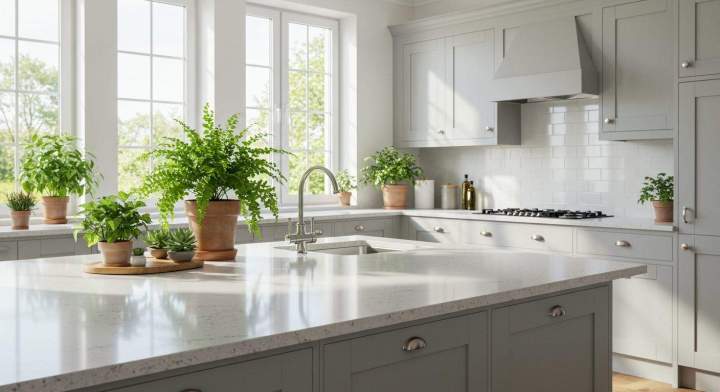The Environmental Benefits of Quartz and Granite Countertops
Quartz Admin / June 27, 2025

Natural and Long-Lasting Materials
Both quartz and granite are renowned for their longevity. When installed properly, these countertops can last decades — often outliving the kitchen appliances around them. Their durability means fewer replacements, which significantly reduces the amount of material waste and manufacturing emissions over time.
Granite is a natural stone, mined in large slabs and then cut and polished for use. It doesn’t require any additional chemicals for production, making it a low-impact material in its raw state. Quartz, on the other hand, is an engineered stone, composed of around 90–95% natural quartz crystals bound with resins and pigments. While the binding agents add a slight environmental impact, quartz manufacturing is highly efficient and generates minimal waste compared to other engineered surfaces.
Energy Efficiency in Production
Quartz manufacturing has improved significantly in recent years. Many quartz producers use recycled materials — such as glass or reclaimed stone — within their slabs, helping to cut down on raw material consumption. Additionally, companies have invested in closed-loop water systems and solar-powered facilities, further reducing their carbon emissions.
With granite, local sourcing can help minimize transportation-related energy costs. Opting for granite that is quarried close to home (rather than imported from overseas) supports local economies and reduces the carbon footprint associated with long-haul shipping.
Low Maintenance, Low Impact
Unlike some surfaces that require harsh chemical cleaners, both granite and quartz can be maintained with simple soap and water or mild, eco-friendly products. Quartz is non-porous, which makes it resistant to stains, bacteria, and mold — eliminating the need for frequent sealing or chemical treatments. Granite is slightly more porous, but modern sealants can maintain its surface integrity for years with minimal environmental toll.
By choosing countertops that are easy to clean and resistant to damage, homeowners can avoid using abrasive products that harm indoor air quality and pollute waterways.
Recyclability and Reusability
At the end of their life cycle, quartz and granite countertops can be repurposed in creative ways. Leftover or removed slabs can be reused in smaller home projects, such as bathroom vanities, garden features, or even decorative wall cladding. This versatility reduces the need to dispose of large amounts of material in landfills.
Some recycling programs also accept quartz and granite for reprocessing. When properly broken down, these materials can be turned into gravel or other construction materials — contributing to the circular economy.
Eco-Certifications and Responsible Brands
Many countertop manufacturers now offer eco-certified products that follow strict environmental standards. Look for certifications, which indicate that the materials have been tested for low chemical emissions and are safe for indoor air quality.
Several brands also focus on sustainable quarrying and ethical labor practices, ensuring that both people and the planet are respected throughout the production process. When shopping for countertops, ask suppliers about the origins of the stone and the sustainability efforts behind the products.
A Smart Choice for Green Homes
Incorporating eco-conscious materials like granite and quartz into your home doesn’t mean sacrificing beauty or performance. These stones offer timeless style and unparalleled strength, making them a favorite for kitchens, bathrooms, and beyond.
By understanding their environmental benefits, you’re not just making a stylish decision — you're making a responsible one. From reduced waste to energy efficiency and recyclability, quartz and granite countertops prove that sustainability and luxury can go hand in hand.